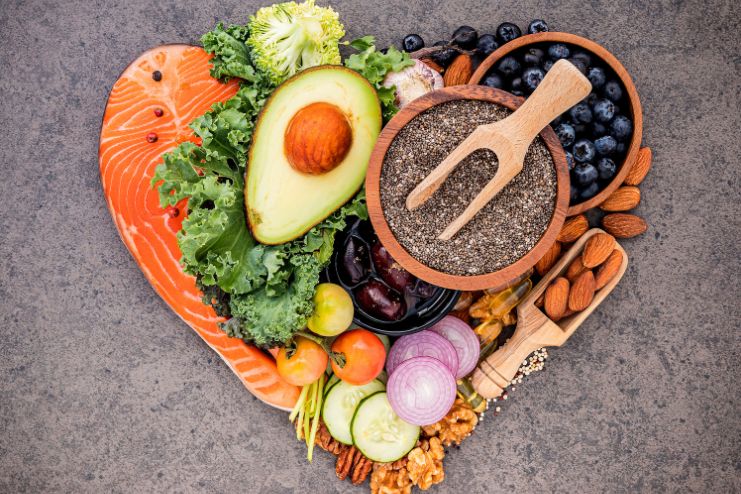Affiliate Disclaimer
Some links in this article are affiliate links. We may earn a small commission if you make a purchase through these links, at no extra cost to you. We only recommend products we find useful to our readersIt may surprise you that avocados are frequently called “nature’s butter.” They are very rich in nutrients that can improve your general health and are creamy and delicious. This adaptable fruit complements any diet because it is full of heart-healthy lipids, vitamins, minerals, and antioxidants.
Avocados are praised for their capacity to promote heart health, help control weight, and nourish skin and hair. They also improve eye health, lessen inflammation, and aid digestion. Adding avocados to your meals can open a world of health benefits, whether you want to mash them for guacamole, blend them into smoothies, or slice them on toast.
This article will discuss avocados’ numerous health and nutritional advantages, examine their remarkable nutrient composition, and offer advice on how to eat them every day.
Read More: Bored of Eggs? Try 6 Healthy Avocado Recipes
Nutritional Profile of Avocado
Avocados are a mainstay in many nutritious meal plans because of their nutritional profile. They are also popular on lower-carb diets, such as those for people with diabetes, because they are high in fiber and provide healthy fats.
A whole medium avocado contains about 240 calories, 13 grams of carbohydrates, 3 grams of protein, 22 grams of fat (including 15 grams of monounsaturated, 4 grams of polyunsaturated, and 3 grams of saturated fat), 10 grams of fiber, and 11 milligrams of sodium. Avocados are cholesterol-free and have a low salt content.
Several elements included in avocados, such as fiber, potassium, carotenoids, and monounsaturated fats, have been linked to lower risk of developing chronic illnesses, mainly when consumed as part of a healthy, balanced diet. Avocados’ nutritional profile complements wholesome eating regimens like the DASH and Mediterranean diets.
American Heart Association and the Dietary Guidelines for Americans advise consuming fewer foods low in nutrients and minimizing sodium, trans fat, saturated fat, and added sugars. Heart-healthy monounsaturated or polyunsaturated fats should make up most of a person’s diet; avocados contain over 75% unsaturated, healthy fat.
Top Health Benefits of Avocado

There are several health advantages to eating a diet rich in different fruits and vegetables. For instance, it may lower the risk of heart disease, diabetes, obesity, and general mortality while encouraging a healthy complexion and hair, more energy, and moderation in weight. Incorporating avocado into your diet can provide the following advantages:
Controls your Weight: Avocados’ high fiber content helps you feel fuller for longer, which may aid in weight management. Since fiber takes longer to digest than other nutrients, you may feel satisfied with less food. Additionally, fiber supports a healthy digestive system by promoting the growth of beneficial gut bacteria.
Excellent for Vision: Two phytochemicals found in eye tissue, lutein and zeaxanthin, are found in avocados. They offer antioxidant protection to reduce damage, including damage from UV rays. Avocados’ monounsaturated fatty acid helps to facilitate the absorption of beta-carotene and other healthy fat-soluble antioxidants. Eating avocados may also help lower the chance of age-related macular degeneration.
Read More: Obese Or Overweight Individuals Can Eat Avocado To Improve Attention
Reduce Cholesterol and Heart Disease Risk: Avocados can increase HDL, or “good,” cholesterol while reducing LDL cholesterol. HDL cholesterol facilitates the removal of excess cholesterol by transporting it to the liver for waste elimination. It lessens plaque accumulation on the arterial walls and lowers your risk of heart disease.
May Help Prevent Osteoporosis: Half an avocado meets about 18% of the daily need for vitamin K. Although it is frequently disregarded, this vitamin is very crucial for healthy bones. Consuming adequate vitamin K can promote bone health by improving calcium absorption and decreasing calcium excretion in the urine.
Promoting Fetal Health: A healthy pregnancy depends on folate. Sufficient consumption lowers the rate of neural tube defects and miscarriage. A pregnant person should take at least 600 micrograms (mcg) of folate daily. There could be as much as around 160 mcg in one avocado. Fatty acids, essential for a balanced diet and embryonic growth, are also found in avocados.
Lowering the Risk of Depression: Avocados are a very good source of folate, which is crucial for dietary health in general. Studies have also linked low folate levels to depression. Folate prevents homocysteine accumulation, which can impede the brain’s ability to receive nutrients and circulate blood.
Relief from Osteoarthritis: Avocados, soy, and other plant foods contain saponins. These drugs may improve the symptoms of osteoarthritis in the knee and hip. However, researchers haven’t yet verified saponins’ long-term impact on osteoarthritis sufferers.
Read More: Avocado for Weight loss – a Myth or A Scientific Fact?
Avocado in Your Diet

Originally known as aguacate or alligator pears, avocados are a fruit unlike any other. They are native to the warmer regions of Mexico and Central America. An avocado’s distinctively smooth and creamy green flesh, covered in a tough outer layer, surrounds a huge center seed.
Avocados are just as tasty as they are healthy. But before you can savor an avocado’s flavor and health benefits, you want to be sure you choose the right one, which can be challenging. Enjoy healthy eating with delicious avocado recipes. It’s easy and tasty to include avocados in your meals.
- Breakfast Ideas:
- Enjoy avocado toast topped with eggs, tomatoes, or smoked salmon.
- Blend avocado with spinach, banana, and almond milk for a creamy smoothie.
- Lunch and Dinner:
- Add avocado slices to salads for a creamy texture and nutritional boost.
- Incorporate avocado into tacos, grain bowls, or pasta dishes.
- Snacks and Sides:
- Prepare guacamole as a dip or a sandwich spread.
- Mash avocado on whole-grain crackers for a quick snack.
Despite their nutrient-dense nature, moderation is essential. Eating half an avocado in each serving is usually advised to balance calorie consumption. Avocados are satisfying because of their high-fat content and can help one avoid overeating. Try out new avocado recipes and take advantage of their many health advantages, which range from heart health to radiant skin.
Read More: Avocado Nutrition Facts For Good Health
1Conclusion
Avocados are an absolute nutritional powerhouse, not just a fad meal. Their benefits are unquestionable, ranging from fostering strong, radiant skin and hair with vitamins C and E to supporting heart health with their monounsaturated fats. Antioxidants such as lutein and zeaxanthin promote eye health, and their high fiber content helps with digestion and weight management.
It can be tasty and healthy to include avocados in your diet. This adaptable fruit may enhance your meals and nourish your body, whether you eat it on toast, in salads, in guacamole, or in smoothies. If you practice good portion management, you can enjoy all the health benefits without going overboard.
Accept the benefits of avocados and incorporate them into your well-rounded diet daily. Your digestion, skin, heart, and general health will all appreciate it.
-
Sep 2016Written by Abhro Bhattacharjee
-
Apr 2025Edited by Ankita
2References
- https://californiaavocado.com/nutrition/avocado-nutrition-facts/
- https://www.medicalnewstoday.com/articles/318620#nutrition
- https://nutritionsource.hsph.harvard.edu/avocados/
- https://www.medicalnewstoday.com/articles/270406#benefits
- https://www.bjc.org/news/exploring-health-benefits-avocados
- https://www.healthline.com/nutrition/23-ways-to-eat-avocados#beverages
In this Article


















